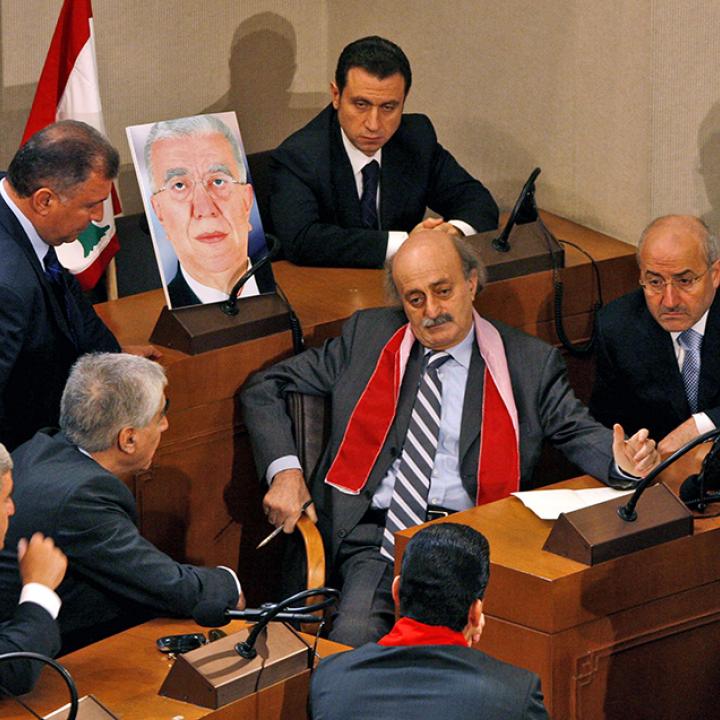

Druze communities in Syria and Lebanon cannot afford to be on the losing side of the ongoing war, and their cautious approach to local tensions reflects that imperative.
The ongoing spillover from the Syrian civil war has disquieted Lebanon's Druze community. With sectarianism brimming, Druze leader Walid Jumblatt has tried to calm recent tensions between Druze and Sunnis. Jumblatt is aware that doing so will assist his Syrian coreligionists, especially in southern Syria, where Sunni extremist groups such as al-Qaeda affiliate Jabhat al-Nusra are gaining ground and posing a threat to local Druze communities.
Jumblatt's concerns are the result of two unprecedented developments within the Syrian and Lebanese communities this past August. For the first time since 2011, Syrian Druze clashed briefly with armed Sunni Bedouins, reportedly backed by Jabhat al-Nusra, in the southern region, where that group and other militant Islamist factions have taken control of the city of Quneitra and the border crossing between Syria and Israel.
A couple of weeks later, residents in the Lebanese Druze village of Ein Atta, close to the Syrian border, attacked a van suspected of transporting radical Syrian militants. Druze authorities intervened before the situation worsened, knowing that the repercussions would not bode well for the Druze in the southern Syrian province of al-Suwayda, an Assad stronghold that is unlikely to fall into the hands of Sunni jihadists.
In late September, following the van incident, Jumblatt visited a number of Sunni, Christian, and Druze villages in Lebanon, mainly those close to the Syrian border such as Ein Atta and Shebaa. He emphasized the importance of unity between all Lebanese regardless of sect or political affiliation. He also highlighted the need to avoid clashes with the one million Syrian refugees who are scattered throughout Lebanon.
Ein Atta is located on a hill close to the strategic Jabal al-Sheikh (or Mount Hermon), which straddles Lebanon, Syria, and Israel. On the eastern side of the mountain lie a number of Syrian-Druze villages, such as Qalaat Jandal, Khodor, Maghar al-Mir, and Arna, which have witnessed clashes between Assad regime forces and rebel groups, including Jabhat al-Nusra, in addition to kidnappings. Although the Free Syrian Army released a video assuring Druze in Maghar al-Mir that it is protecting them, Jabhat al-Nusra has reportedly abducted young Druze men from the village.
Jumblatt's visit to the Sunni-majority town of Shebaa was also very timely. The situation there is delicate since Shebaa absorbed a massive number of Syrian refugees. It also neighbors Druze areas such as Hasbaya. The van that Druze locals attacked in Ein Atta was reportedly on its way from Shebaa and heading to Lebanon's Beqaa Valley, where the army and Syria-linked militants have been fighting -- specifically around the Sunni town of Arsal. This has raised questions over whether Syrian extremists might destabilize Shebaa in the same way they have Arsal. Jumblatt is aware of the possibility of sectarian strife restarting in the wake of a number of crises in Lebanon, including the Arsal hostage crisis, in which militants from the Islamic State of Iraq and al-Sham and Jabhat al-Nusra took hostage a number of Lebanese soldiers (seven of whom are Druze). His visit to Shebaa was seen as a gesture to prevent the Sunni town from becoming the "next Arsal."
For the most part, Jumblatt is currently on the same page with other Druze leaders, including his rival, Talal Arslan. They are aware that as a minority community, whether in Syria or Lebanon, they cannot afford to drag themselves further into the Syrian civil war or Lebanese sectarian strife. All the Druze can do now is overcome their plight pragmatically. "Our responsibility is to protect the army and the government institutions, as we also need to put our political disagreements aside to protect Lebanon," Jumblatt recently said. His statement harks back to the early days of the Syrian uprising when Druze protestors used to chant "souriya wahida," or "Syria is one."
Since the Syrian Druze cannot rely on any foreign power to protect them, unlike religious and ethnic minorities in Iraq, they are still sticking with the Assad regime. For the Druze, one fact is clear: they cannot afford to be on the losing side of Syria's bloody civil war.
Noam Raydan is a research associate at The Washington Institute and Arabic editor of Fikra Forum.
Fikra Forum



